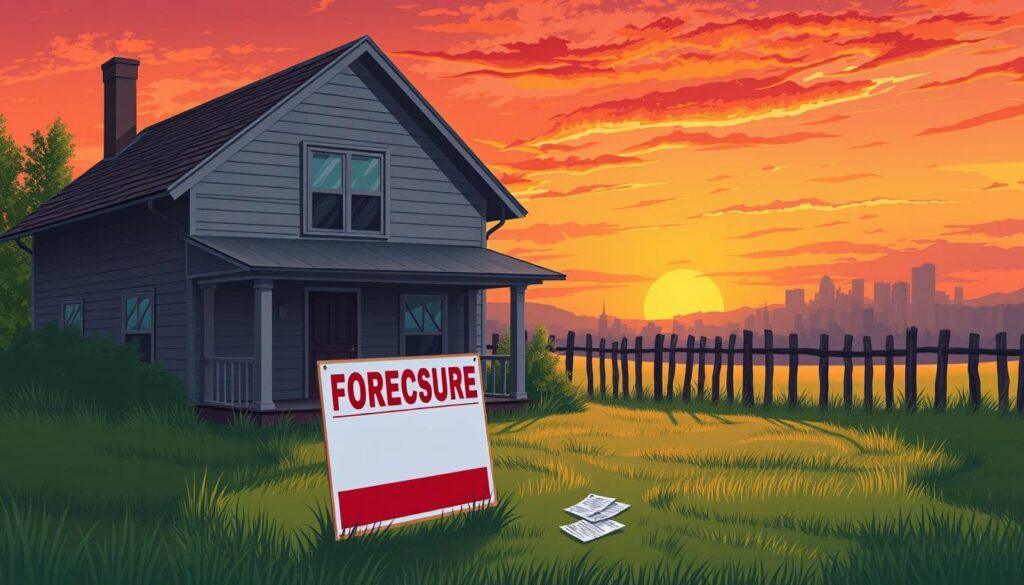Can selling your home in foreclosure help you take back control of your finances? Many homeowners feel lost and scared when facing foreclosure. But, selling your house during this time can actually help you avoid bigger losses. We’ll look at your options and guide you through the steps to sell your house successfully.
If you’re wondering if you can sell a house in foreclosure or if you should sell a house before foreclosure starts, acting quickly can help. It can lead to a path towards recovery and financial stability.
Key Takeaways
- The average foreclosure process in the U.S. takes about 815 days.
- Mortgage companies typically initiate foreclosure three to six months after a missed payment.
- Homeowners can often sell their property quickly if the real estate market is favorable.
- Waiting until the last minute to sell can lead to aggressive selling and reduced profits.
- Working with an experienced real estate agent can enhance the chances of a successful sale.
- In many states, banks cannot proceed with foreclosure if there is a legitimate offer on the property.
The Foreclosure Process Explained
The foreclosure process is complex and stressful for homeowners. Knowing the foreclosure timeline is key to taking steps to avoid losses. Homeowners face foreclosure risk after missing mortgage payments. The process starts after three to six months of missed payments, with lenders sending urgent notifications.
Understanding the Timeline of Foreclosure
The foreclosure timeline has several stages:
| Milestone | Timeframe | Description |
|---|---|---|
| First Missed Payment | 0-30 Days | Lender reaches out via letter or phone. |
| Second Missed Payment | 30-60 Days | Follow-up communication likely via phone. |
| Demand Letter Sent | 60-90 Days | A demand letter is issued for overdue payments. |
| Notice of Default (NOD) | 90-120 Days | Borrower has 30 days to remedy before foreclosure starts. |
| Foreclosure Proceedings Begin | After 120 Days | Legal steps are initiated to reclaim the property. |
| Public Auction | Varies by State | Timeframe from NOD to auction can be as short as 60 days. |
What Triggers Foreclosure Proceedings?
Several factors can lead to foreclosure. Common reasons include:
- Job loss or reduction in income
- Significant medical expenses
- Divorce or separation
- Unexpected home repairs or maintenance costs
Knowing these triggers helps homeowners spot risks early. Understanding the foreclosure process empowers them to act. They can negotiate with lenders or explore selling their home to avoid foreclosure.
Can You Sell a House in Foreclosure?
Homeowners facing foreclosure often feel stressed and overwhelmed. The good news is that you can sell a house in foreclosure. Knowing your options can help you make decisions that might improve your financial situation. It’s important to act fast.
There are several ways to sell your home, including traditional sales, working with real estate investors, or short sales.
Options Available for Homeowners
When dealing with foreclosure, consider these options:
- Traditional Sale: You can list your home with a real estate agent to sell before the auction.
- Short Sale: Selling your home for less than the mortgage balance might be a good choice if your lender agrees to forgive the debt.
- Investor Purchase: Real estate investors might offer quick sales and cash, helping you financially.
- Bankruptcy Filing: This can pause foreclosure while you figure out your next steps.
Benefits of Selling During Foreclosure
Selling during foreclosure can have many benefits. You can:
- Mitigate Credit Damage: Selling early can reduce the credit score drop from foreclosure, which can be over 100 points.
- Recover Equity: If the market is good, selling can help you get back some of your lost equity, useful for moving or paying off debts.
- Avoid Deficiency Judgments: Selling correctly can stop lenders from seeking money from you, giving you financial relief.
- Maintain Control: Selling your home lets you control the process and timeline, unlike waiting for foreclosure.

With the right approach, homeowners can handle selling a home in foreclosure well. Knowing your options is the first step to getting back on track financially.
Selling a House in Pre-Foreclosure
Selling a house in pre-foreclosure is a chance for homeowners in trouble. This happens when someone misses mortgage payments but hasn’t gone through foreclosure yet. It’s a key time to act, helping homeowners keep their equity and avoid foreclosure.
What is Pre-Foreclosure?
Pre-foreclosure is when homeowners are late on mortgage payments but haven’t been foreclosed on. In Virginia, lenders start foreclosure about 120 days after payments are missed. Most mortgages give a 15-day grace period before penalties kick in.
This grace period lets homeowners catch up or sell the house instead of facing foreclosure.
Strategies to Sell Before Foreclosure
Using smart strategies to sell before foreclosure can greatly help a homeowner’s finances. Here are some ways to sell successfully:
- Timely Repairs: Fixing up the house makes it more attractive to buyers. This usually leads to better offers.
- Staging: Showing the house in its best condition can draw in more buyers. A well-staged home makes a good impression and encourages quick offers.
- Collaborating with a Real Estate Agent: Working with a good agent who knows the local market can help. They can give valuable advice on pricing and marketing.
- Competitive Pricing: Priced right, the house will attract more buyers. Knowing the local market is key to setting a good price.

These strategies help keep equity and avoid foreclosure’s credit damage. Planning ahead in the pre-foreclosure period lets homeowners make informed decisions that fit their financial goals.
Steps to Sell Your Home During Foreclosure
Homeowners facing foreclosure have several options to help their situation. Knowing how to sell during foreclosure is key for a quick sale. Preparing your home well can greatly improve your chances of a good sale.
Preparing Your Home for a Quick Sale
To sell fast, your home must look its best. Here are some steps to take:
- Declutter to make rooms feel bigger.
- Fix any big problems with repairs.
- Clean every room, especially bathrooms and kitchens.
- Make the outside look good with landscaping and upkeep.
- Stage your home to draw in buyers.
These actions can attract more buyers and speed up the sale. This is crucial for those under financial stress during foreclosure.
Choosing Between a Real Estate Agent and Selling to an Investor
Choosing between a real estate agent and an investor depends on your situation. Consider these points:
| Aspect | Real Estate Agent | Investor |
|---|---|---|
| Speed of Sale | Longer due to market listings and negotiations. | Faster, often with cash offers within days. |
| Repair Requirements | Homes may need repairs and staging. | No repairs needed; sell as-is. |
| Commission Fees | Usually 5-6% of sale price. | No commissions; direct cash offer. |
| Closing Time | Typically 30-60 days. | Can close in as little as 7 days. |
For those in a hurry, selling to a local cash buyer or investor is often best. This choice offers a quick process that eases the emotional and financial stress of foreclosure. Knowing these options is key to making a smart decision.
Understanding Short Sales and Their Implications
Short sales are key for homeowners in tough financial spots. A short sale happens when a lender agrees to take less money than owed on a mortgage. This lets a homeowner sell their property without facing foreclosure. It’s a big help for those ready to deal with the short sale’s challenges.
What is a Short Sale?
A short sale is a choice made by the homeowner, unlike foreclosure, which lenders start. Homeowners can stay in their homes while selling, which might take a year. Even though it can hurt your credit, it’s often better than foreclosure.
Foreclosures stay on your credit for seven years. But, a short sale might let you improve your credit faster.
How to Initiate a Short Sale Process
Starting a short sale requires a few important steps:
- Tell your lender right away if you’re having money troubles. Make sure they know what’s going on.
- Get all the needed papers ready, like your financial info and a letter explaining why you need a short sale.
- Find a real estate agent who knows about short sales. They can help you through this tough process.
Knowing about short sales can help homeowners make better choices about their money. Lenders might not agree to a short sale if you’re not behind on payments or if they think they can get more money from foreclosure. Since short sales happen more often when the housing market is down, it’s crucial to stay informed.
| Aspect | Short Sale | Foreclosure |
|---|---|---|
| Initiation | Voluntary by homeowner | Involuntary by lender |
| Timeframe | Up to one year | Approximately 120 days to several years |
| Credit Impact | Less severe | More severe |
| Staying in Property | Typically allowed | Not allowed once initiated |
| Resale Opportunities | Potential for buyers to purchase below market value | Properties sold by lender |
Common Challenges and Legal Considerations
Selling a house during foreclosure comes with its own set of challenges. Homeowners might face legal issues, like deficiency judgments after the sale. Keeping in touch with lenders is key throughout the process.
Potential Deficiency Judgments
Homeowners might still owe money after selling a foreclosed property. This happens when the sale price is lower than the mortgage balance. For example, if a home sells for $200,000 but the mortgage is $250,000, the lender can go after the homeowner for $50,000.
It’s important to understand the risks of deficiency judgments. This knowledge helps manage expectations.
Working with Your Lender During the Sale
Good communication with lenders is crucial when selling a foreclosed home. Lenders must talk about options within 36 days of a missed payment. If you’re struggling financially, reach out early to discuss possible solutions.
Staying in touch with lenders can help you negotiate better terms. This might reduce the impact of deficiency judgments. Being proactive can make the process smoother and protect your legal rights.
Conclusion
Homeowners facing foreclosure need to act fast to avoid further financial loss. Selling your home during foreclosure is possible. Knowing your options can greatly improve your financial future.
Starting a pre-foreclosure sale can lead to a better price and more control. It’s crucial to seek help from experts. Real estate agents, financial advisors, and government programs can offer valuable support.
By working with these professionals, you can negotiate with lenders. This might include short sales or loan modifications. These steps can help protect your credit and future financial opportunities.
Being proactive, whether through selling or pre-foreclosure strategies, is key. It helps safeguard your financial health. Making smart choices during tough times is essential.






